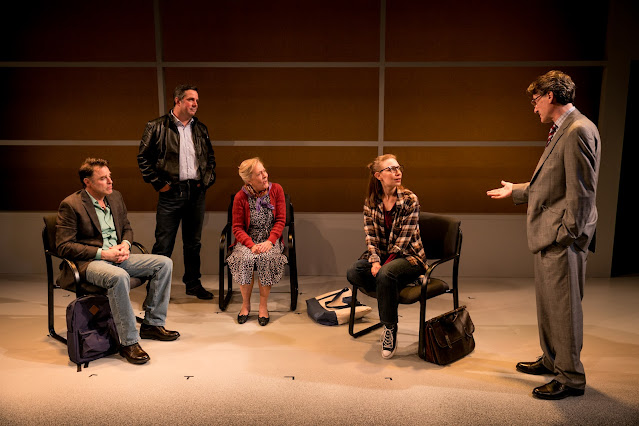The Karpovsky Variations
Written by Adam Kraar
Directed by Tasha Gordon-Solmon
502 W 53 St., Manhattan, NYC
May 13-29, 2022
 |
| L to R: J. Anthony Crane, Chris Thorn, Barbara Broughton, Rivka Borek, and Ezra Barnes. Photo by Isaiah Tanenbaum Theatrical Photography |
In basic musical terms, variations, of which there are a number of types and approaches, repeat material in a changed form. With playwright Adam Kraar's
The Karpovsky Variations, currently making its world premiere courtesy of
Boomerang Theatre Company, the titular variations metaphorically encapsulate the individual and cross-generational experiences of the imperfect but loving family at its center. Music also plays a significant literal role in the story of the Karpovsky clan, a wonderfully acted exploration of the search for one's own song, both solo and within the sometimes tumultuous chorus of family.
Julia Karpovsky (Rivka Borek) serves as the narrator in the play's frame, beginning from the day after a significant life event in her present of 2006 and with flashbacks covering multiple decades. By the time of the play's present, only-child Julia has long struggled with defining herself and with a desire to deepen her connection to her heritage and, more particularly, to her father. In one of the earliest flashbacks, her father, Lawrence (Ezra Barnes), a journalist who covers Asia, is sending his 15 year-old daughter to attend a boarding school in the U.S. while he travels after having moved from country to country for years (Kraar himself
had a transnational upbringing). Lawrence (not, he is adamant, Larry), we begin to learn, in addition to often being physically unavailable, is fairly emotionally closed off, preferring to keep his own counsel. Meeting him and Julia at the airport are his brother Barry (J. Anthony Crane), who works in international charity, and Julia's great-grandmother Rose (Barbara Broughton), who wears a bracelet with a charm for each of her children, grandchildren, and great-grandchildren and who once heard a song in Kraków that is something of a white whale for Julia. Julia calls this Jewish family with its roots in Poland "a family of wanderers," and the majority of scenes take place in the anonymous gray waiting areas of airports. Indeed, the third brother of these inveterate travelers, Harold, or Harry (Chris Thorn) takes up flying small planes as a hobby as he becomes a wildly successful optometrist. Flight can constitute freedom, power, avoidance, or any admixture thereof; and even Lawrence's second wife, Maxine (Michelle Liu Coughlin), appears to be a seasoned world traveler–as well as a bit of an outsider from the family into which she married.
.jpg) |
| Rivka Borek. Photo by Isaiah Tanenbaum Theatrical Photography |
At one point, the play introduces the rich metaphor of family stories as songs, replayed and passed on. But playing music in The Karpovsky Variations also represents a state of sought-after freedom. Julia's grandfather and father both loved playing music, the former passing his clarinet to the latter, but, of course, "real" life tends to get in the way of such love. Julia more than once denies that she is like her dad, as many offspring doubtless say of themselves and their parents, and she loves to play, but can she make music her living, and, more importantly, make it her own (even as parts of her life ring variations on, for example, those of Lawrence and Rose)? The inevitable losses that family entails are woven into the Karpovsky chorus as well, with one instance provoking a decision by Barry that provides the play's climactic conflict, which is appropriately implicated in personal and family histories and traditions. Rose's bracelet in juxtaposition to the clarinet passed down from father to father certainly leaves room for some Freudian interpretation of all this as well, were one so inclined. |
| Rivka Borek and Ezra Barnes. Photo by Isaiah Tanenbaum Theatrical Photography |
The individuals who populate
The Karpovsky Variations always feel authentic and well-observed, even in its most unusual plot point. Complementarily, the production's effectively spare staging keeps the focus on the superb cast, whose work is nuanced (down to a subtle shift in accents in one flashback) and enthralling. A symphony-sized story told as an intimate chamber piece,
The Karpovsky Variations really sings.
-John R. Ziegler and Leah Richards

.jpg)




Comments
Post a Comment